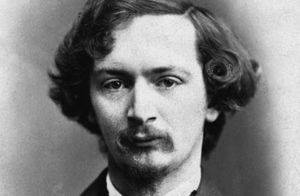Algernon Charles Swinburne
Algernon Charles Swinburne (aka Algernon Swinburne) was interested in flagellation, sadomasochism, bisexuality, and lesbianism, not only for their erotics but also as gestures of social and cultural rebellion.
He was born on April 5, 1837, to Charles and Jane Swinburne. The Swinburnes were an old and wealthy family, and Swinburne grew up in comfort on the Isle of Wight. A sickly child, he was educated for four years at Eton but was removed by his parents before he had completed his studies.
He continued his education under a series of private tutors and went up to Oxford in 1856. Though he was a talented scholar, he was sent down for a disciplinary infraction and never sat the examinations for his degree.
Swinburne had a striking appearance; he was very short and thin, with a huge head and large quantities of flame-red hair. He had a nervous temperament, could behave erratically, and was subject to tremors.
His early talent was apparent; he wrote plays in a Jacobean style in his early teens and grew up speaking both French and Italian. He also had a lively interest in flagellation--a taste probably acquired at Eton, and he shared his sexual interests with, among others, Lord Houghton, who had amassed a large library of erotica.
For his own entertainment, Swinburne composed flagellation sketches, farcical novels, and reviews of nonexistent French poets. He tried to publish some of these works, but primarily he circulated them among his friends--who included Dante Gabriel Rossetti, his brother William Rossetti, and Edward Burne-Jones of the Pre-Raphaelite brotherhood. Swinburne was known as a great republican and had a particular hatred of Napoleon III.
For Swinburne, critical success and controversy came in quick succession. His drama Atalanta in Calydon, which combined Swinburne's felicitous effects of sound with an attention to Greek dramatic structure, was published to great acclaim in 1865.
The next year his Poems and Ballads scandalized Victorian critical and moral opinion and was withdrawn from circulation by its publisher. The volume included "Dolores," which glorified masochism, "Hermaphroditus," which exhibited Swinburne's lasting interest in bisexuality, and "Anactoria," which glorified lesbianism in an address of Sappho to her lover.
Swinburne was a masochist and a flagellant who enjoyed visits to the flagellation brothels of London, particularly an establishment named "Verbena Lodge." He was fascinated by lesbianism and bisexuality not only for their erotics but because he interpreted them as gestures of social and cultural rebellion.
His friendships with George Powell and Simeon Solomon encouraged his interest in same-sex sexuality, though he was at times ambivalent about what he called Solomon's "Platonism ". Swinburne was staunchly antitheistic and saw in sadomasochistic and same-sex sexuality possible extensions of Shelleyan revolt.
Swinburne wrote in every genre with varying success. His works include two novels, Love's Cross-Currents and Lesbia Brandon, long verse plays, and many collections of verse. By the late 1860s, Swinburne had become addicted to alcohol, and it quickly undermined his health. His alcoholic sprees also began to lose him friends.
In 1879, Theodore Watts (later Watts-Dunton), a solicitor and minor writer, established Swinburne in his house in Putney outside London. Watts tactfully weaned Swinburne from alcohol and from those of his friends who had encouraged him to drink. Though the household treatment at Putney might be thought stifling, Watts undoubtedly saved Swinburne's life. Swinburne continued to write until his death thirty years later.
Swinburne remained devoted to the romantic ideal of the supremacy of the imagination even as his political beliefs turned sharply to the right in his old age. Swinburne's death occurred when Watts himself was ill in bed and could not supervise him; Swinburne walked outside in bad weather and contracted pneumonia. He died on April 10, 1909. As he had requested, the Christian burial service was not read over him.
- Works by Algernon Charles Swinburne
Chat rooms • What links here • Copyright info • Contact information • Category:Root
